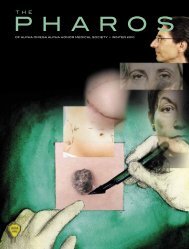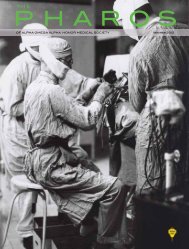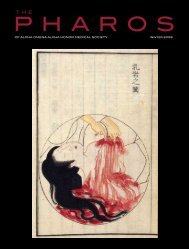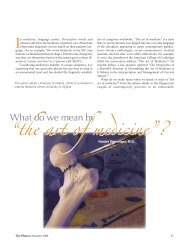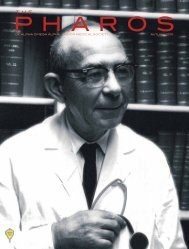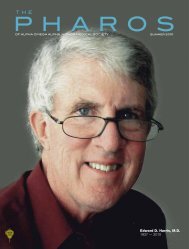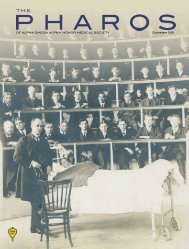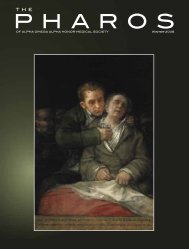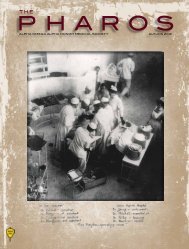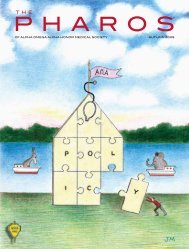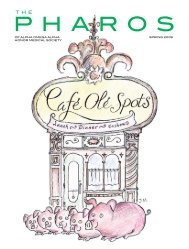Download The Pharos Winter 2011 Edition - Alpha Omega Alpha
Download The Pharos Winter 2011 Edition - Alpha Omega Alpha
Download The Pharos Winter 2011 Edition - Alpha Omega Alpha
You also want an ePaper? Increase the reach of your titles
YUMPU automatically turns print PDFs into web optimized ePapers that Google loves.
Editorial<br />
<strong>The</strong> song goes on<br />
Robert Atnip, MD<br />
<strong>The</strong> author (AΩA, University of Alabama, 1976)<br />
is a member of the board of directors of <strong>Alpha</strong><br />
<strong>Omega</strong> <strong>Alpha</strong>.<br />
am an academic vascular surgeon, a senior fac-<br />
I ulty member at a University Hospital, a mentor<br />
of medical students and residents, and a teacher<br />
of professionalism. My own lessons in professionalism<br />
came while in medical school, but<br />
not in any classroom or book. I don’t recall the<br />
word even being spoken during those four years<br />
(1974–78). No doubt some of those who modeled<br />
it for me were physicians, but in retrospect, the<br />
most influential person was no doctor, but a musician.<br />
That music has the power to pervade the human experience<br />
may be a mystery, but it is no secret. Music is as universal<br />
as the human senses, and as vital. As a form of human<br />
expression, music is at the same time both elemental and<br />
transcendent. It is one of humanity’s finest gifts to itself, a<br />
gift that to our lament cannot be as readily celebrated in <strong>The</strong><br />
<strong>Pharos</strong> as the visual and literary arts. Music is not for speaking<br />
or writing. Music is ineffable emotion, a sequence of nameless<br />
swells and surges that defy the bounds of speech. Our voices<br />
are put to much better use making music than describing it<br />
and, in like manner, professionalism is much less a creed to<br />
be discerned and codified than it is a craft to be realized and<br />
enacted. <strong>The</strong>rein lies the basis for choral music to instruct me<br />
in the finer points of professionalism.<br />
Nowadays, professionalism is a paramount concern to the<br />
health care world, but it was not always so. “Professionalism”<br />
was irrelevant to academia prior to 1965. My search for “professionalism”<br />
as a key word in OLD_OVID (1947–65) returned<br />
only the red-lettered retort, “Unable to match with any subject<br />
heading.” In the fifteen years that followed, “professionalism”<br />
made its debut with 180 appearances, the majority in nursing<br />
journals or, oddly enough, in the dentistry literature. But only<br />
in the last thirty years has “professionalism” gained enough<br />
traction to merit the eight subject headings to which it now<br />
maps in OVID, the thousands of publications devoted to<br />
probing its obliquities, or the several awards and grants now<br />
bestowed in its name by prestigious societies such as ours.<br />
This logarithmic progression is extraordinary for a concept<br />
that acquired its name as long ago as the fourteenth<br />
century. Toward the end of the so-called Dark Ages, the word<br />
“profess” appeared among religious orders with the meaning<br />
“to take a vow,” or “to declare [a belief] publicly.” This definition<br />
and related word forms served adequately, perhaps even<br />
admirably, throughout all subsequent ages of history and into<br />
modern times. Only in the post-Modern era has the simplicity<br />
and sparse eloquence of these phrases come to be viewed as<br />
inadequate for today’s professionals. But I think what may be<br />
lacking is not the words, but the . . . music!<br />
And so in the mid-1970s, modern professionalism’s “early<br />
years,” I came upon my unwitting mentor-to-be while in medical<br />
school in Birmingham, Alabama. Having enjoyed music<br />
and singing as a youth, and wanting some activity<br />
beyond the confines of studying anatomy<br />
and physiology, I met JWS, the organist and<br />
choirmaster at a local church. <strong>The</strong> meeting<br />
was happenstance, but serendipity has never<br />
worked any better magic than this. I joined and<br />
sang in his choir, as much an amateur singer as<br />
I was a fledgling doctor. But the experience was<br />
profound, a turning point for me, and a revelation<br />
of new worlds. For the next three years this<br />
choir became as important to me as my medical<br />
education. Under the direction of JWS, or more<br />
properly, under his spell, I learned what it is to<br />
“profess” choral music: to blend many voices into one sound,<br />
the music built on every voice, but ever greater than any one<br />
alone; to tune each voice and phrase toward perfection; to purify<br />
many harmonies into one great and coherent beauty. <strong>The</strong><br />
sounds and the music were exquisite, many of them recorded<br />
at that time, and still inspiring to me more than thirty years<br />
later. To listen to them is to understand the fruits of professionalism<br />
and, moreover, to discern therein a startling similarity<br />
to what we seek to do in the individual and corporate acts<br />
of medical practice.<br />
This connection of music to medicine may seem obscure to<br />
some, and self-evident to others. But I contend that the truths<br />
learned in the making of music are the same truths that we<br />
who profess medicine must teach our students, and re-affirm<br />
for ourselves: competence, discipline, determination, focus,<br />
artistry, the seeking of common goals, the drive to excel, the<br />
ability to lead and to follow, and one perhaps not as obvious:<br />
aesthetics—the presence of beauty and inner harmony in what<br />
we do. I do not equate humanism with professionalism, but<br />
they have much in common. <strong>The</strong>y are separate yet inseparable,<br />
linked by a common need for each to nourish the other. I was<br />
most fortunate at a remarkable and formative time of my life to<br />
be in a milieu suffused with an abundance of each. To those who<br />
cleared this path for me, I owe an inexpressible debt. <strong>The</strong>y knew<br />
that professionalism has not only a body, but a soul.<br />
It was never my destiny to become a professional musician,<br />
but I am delighted to be a musical professional. Music may not<br />
have made me a better medical scientist, but it has made me a<br />
better physician. Vita brevis, ars longa. To the extent that we<br />
are true to our identity as healers, then we must—in concert<br />
with advances in science and technology—remain centered on<br />
the collective humanity of patient and physician, which in all<br />
its forms is our common bond.<br />
JWS retired in 1998, and died in 2007 of Parkinson’s<br />
disease. He and Ted Harris were much alike. <strong>The</strong>y were extraordinary<br />
persons who led others to perform beyond expectations,<br />
and showed all those around them that exceptional<br />
effort yields uncommon rewards. <strong>The</strong>se two men were called<br />
into different professions, but each understood precisely what<br />
it meant to “take a vow.” and to “declare publicly.” It is to the<br />
betterment of humankind that each lived, and thus our own<br />
joyful duty to ensure that their song goes on.<br />
<strong>The</strong> <strong>Pharos</strong>/<strong>Winter</strong> <strong>2011</strong> 1



